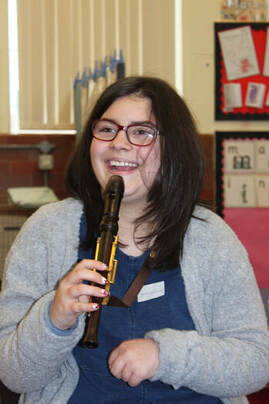 A one-handed recorder being tested at an OHMI event A one-handed recorder being tested at an OHMI event It’s now 25 years since the Disability Discrimination Act (DDA) was passed. The Act made it illegal for employers and service providers to discriminate against someone because they were disabled. There was, however, some criticism of its implementation. Whilst the legislation was passed in 1995, it was not until 1996 that employers and service providers were expected to make “reasonable adjustments”; and not until 2004 that the legislation applied to companies employing fewer than 15 people. The DDA may well have improved access in the workplace and across restaurants, libraries and arts and cultural venues, but what of other settings of significant educational and social value? Can we say that people with a physical impairment are able to enjoy the same level of access as those without, in all aspects of their lives? It is expected, both legally and morally, that disabled people are not denied the same access to concert halls and other music venues as their differently-abled counterparts. Yet when it comes to making music of their own, unlimited and undifferentiated participation remains an issue. This is perhaps unsurprising when virtually no musical instruments can be played without ten highly dextrous fingers. This creates limits to those with congenital disabilities and to amputees, as well as the millions who may have been injured, suffered a stroke, developed arthritis or for whatever reason lack the full strength and control of their upper limbs. Instruments require adaptation. Many have yet to be made available. For those that are, their purchase proves often to be financially prohibitive. As the country take stock of how 25 years of the DDA has had an impact on those living with a physical impairment, it’s timely that the OHMI Trust reflects on its own tenth anniversary and all it has achieved in opening up access to music-making: specifically in the core areas of research, innovation and teaching. The OHMI Trust was born in 2012 with just two trustees (Stephen Hetherington and Martin Dyke) no money, two volunteers (Stephen’s and Martin’s daughters), but with lots of ambition. Recognising that the lack of instruments is the first barrier to participation, OHMI launched its first competition, which was a collaboration with the Austrian arts and technology festival, Ars Electronica. The Competition challenge remains: to create musical instruments that can be played without the use of one hand and arm. Competition winning instruments take life in two ways: firstly, making music-making both accessible and affordable via OHMI’s Instrument Hire Scheme; and secondly, through OHMI’s Music-Makers teaching programme. Following its inception as a teaching pilot in Birmingham in 2015, Music-Makers was extended first to Hampshire and Surrey, and then to Nottingham and Northamptonshire. It was perhaps bringing together researchers, musicians, teachers, charities, funders, and government agencies from five continents at OHMI’s first conference on Music & Physical Disability: From Instrument to Performance in 2018, that accelerated OHMI’s ambitions in research. The following year, the OHMI Research Partnership was established with Queen Mary University, London and Birmingham City University. Its purpose is to form new research partnerships on music and disability with universities, researchers, musicians, educators, sociologists and instrument makers globally. Today, music-making for those living with an upper arm impairment is more accessible than ever. OHMI’s Instrument Hire Scheme collection exceeds 300 instruments and pieces of enabling apparatus. Its teaching programme has extended across the UK and its competition continues to support the design and manufacture of suitable instruments. It was certainly music to the ears of all those involved in OHMI that the UK Government shares OHMI’s belief in the importance of undifferentiated access to music-making. In describing the ‘New National Plan to Shape the Future of Music Education’ (published in February 2020), it pledged that, “Children from all backgrounds and every part of England should have the opportunity to learn a musical instrument; to make music with others; to learn to sing; and to have the opportunity to progress to the next level of excellence if they wish to”. The intent is certainly there. If the anniversary of the DDA tells us anything, however, it is that equality – whilst having gathered significant pace over recent years – has certainly not reached journey’s end. Comments are closed.
|
CategoriesArchives
June 2024
|

 RSS Feed
RSS Feed
